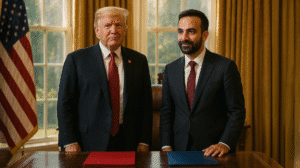Panama has announced that it will not renew its Belt and Road Initiative (BRI) agreement with China, marking a major shift in its foreign policy. President José Raúl Mulino confirmed the decision following a meeting with U.S. Senator Marco Rubio, indicating that Panama is reassessing its relationship with China amid growing pressure from Washington. The 2017 agreement, which made Panama the first Latin American nation to join China’s ambitious global infrastructure project, is set to expire in the coming years, and the Panamanian government has now opted against renewal.
Panama’s Initial Engagement with the BRI
Panama’s involvement with the BRI was initially seen as a transformative opportunity for infrastructure development and economic growth. Chinese investment in Panama has been extensive, including significant projects near the Panama Canal and various infrastructure improvements. The agreement facilitated trade and connectivity, positioning Panama as a strategic partner in China’s broader ambitions in Latin America. However, it also raised concerns in Washington, where policymakers viewed China’s growing influence over a critical global trade chokepoint with suspicion.
U.S. Concerns and Diplomatic Pressure
Senator Marco Rubio’s visit to Panama underscored growing U.S. unease over China’s footprint in the region. The United States has long viewed the Panama Canal as a critical asset for global commerce and U.S. strategic interests. Chinese companies currently operate key ports at both ends of the canal and have been involved in other major infrastructure projects, fueling concerns in Washington about Beijing’s leverage over one of the world’s most crucial maritime routes. Rubio warned that continued Chinese involvement in the canal region was unacceptable and suggested that failure to curb Beijing’s influence could prompt further U.S. actions.
Panama’s Justification for Withdrawal
President Mulino has framed the decision as one based on national interest rather than external pressure. He emphasized that Panama must reassess its long-term economic and geopolitical partnerships, ensuring that the country remains neutral in great-power competition.
While China remains an important economic partner, Mulino has signaled a desire to maintain stronger ties with the United States, Panama’s traditional ally. Panama’s government has also cited concerns about debt sustainability and the economic viability of certain BRI-funded projects, a criticism that has been echoed by other countries reconsidering their participation in the initiative.
China’s Response and the Future of Sino-Panamanian Relations
China has expressed disappointment over Panama’s decision but has refrained from issuing direct retaliatory threats. The Chinese government maintains that the BRI has provided significant economic benefits to participating countries, fostering trade and development. However, Beijing’s broader strategy in Latin America may need recalibration as more nations reassess their involvement in the initiative.
While Panama’s decision represents a diplomatic setback for China, it is unlikely to sever economic ties entirely, given the deep trade connections between the two countries.
Implications for Latin America and Global Geopolitics
Panama’s decision to withdraw from the BRI has broader implications for Latin America’s geopolitical landscape. Other nations in the region that have signed onto the initiative, including Argentina, Chile, and Peru, may reconsider their agreements particularly if U.S. diplomatic pressure intensifies. This development also underscores the increasing competition between the U.S. and China in Latin America, as Washington seeks to counter Beijing’s influence through economic incentives and diplomatic engagement.
Final Remarks: What This Means for Panama and the World
Panama’s move away from the BRI is a significant geopolitical signal. On one hand, it strengthens U.S.-Panama relations and aligns the country more closely with Washington’s broader strategic goals. On the other hand, it may result in economic consequences, as China has been one of Panama’s largest trading partners and investors in recent years. The decision also raises questions about the fate of existing Chinese investments in Panama and whether Beijing will continue to engage in the country at the same level.
From a global perspective, Panama’s withdrawal highlights rising skepticism toward China’s BRI, particularly in regions where the U.S. retains influence. It suggests that China’s ambitious global infrastructure strategy is facing challenges, as recipient nations weigh the benefits against rising geopolitical risks.
Whether other Latin American nations follow Panama’s lead remains to be seen, but this development marks an important shift in the balance of power in the region.

















